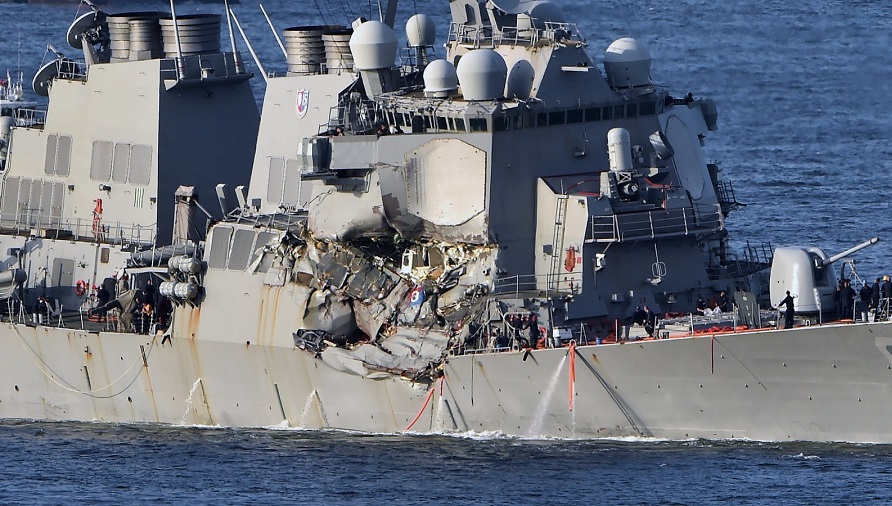US Navy warships have been involved in four major accidents in the Asia-Pacific this year, including three collisions with civilian vessels.
First in January the guided-missile cruiser USS Antietam ran aground while trying to anchor in Tokyo Bay. Then in May the guided-missile cruiser USS Lake Champlain was struck by a South Korean fishing boat off the coast of Korea.
Next month the destroyer USS Fitzgerald was struck by a gigantic container ship in crowded waters off the coast of Japan. 7 US sailors were killed and the ship seriously damaged.
Finally last month the destroyer USS John S. McCain was struck by a massive tanker near Singapore port, killing 10 sailors aboard the American vessel.
Already after the second collision, western media in Australia, UK and the US began raising the possibility the ships suffered accidents because they were “hacked” by an unnamed enemy (read—China):
“There’s something more than just human error going on because there would have been a lot of humans to be checks and balances,” Jeff Stutzman, an ex-information warfare specialist in the Navy, who now works at a cyber threat intelligence company, told McClatchyDC.
“When you are going through the Strait of Malacca, you can’t tell me that a Navy destroyer doesn’t have a full navigation team going with full lookouts on every wing and extra people on radar,” he said.
Itay Glick, the founder of cyber security firm Votiro, told news.com.au that the possibility of cyber interference was the first thing that came to his mind when he heard about the incident.
“I don’t believe in coincidence,” Glick told the website.
The US Navy itself fed the speculation by confirming it was investigating the possibility of a cyber attack, though it admitted it had no reason to suspect one.
2 clarify Re: possibility of cyber intrusion or sabotage, no indications right now…but review will consider all possibilities
— Chief of Naval Operations (@USNavyCNO) August 21, 2017
Actually, nobody attacked the ships.
Instead, as Singapore investigators first pointed out days ago, the Americans had been sailing in crowded waters with their Automatic Identification System switched off so that unlike commercial ships they were sending out no information on their position, speed and heading.
17 deaths later the Navy has announced a policy change. From now on in busy waters US warships will switch on their AIS beacons, which commercial ships are required to have enabled at all times.
No wonder Navy ships have had so many collisions. Turns out they had been operating without ID systems turned on! https://t.co/7Y3Wepi8oA
— Gareth Porter (@GarethPorter) October 2, 2017
An equally serious cause of these accidents was fatigue. The US Navy has maintained such an aggressive posture, against Russia, in the Middle East, and particularly against China, that its fleets are stretched thin and crews exhausted.
As War Is Boring points out in the article “The US Navy Is Flat Worn-Out“, the US Navy admits its sailors often work 100-hour weeks where civilian seamen are barred from working more than 72 hours per week. The reason is simple—exhausted sailors make mistakes:
Seamanship is one of the world’s toughest jobs and working hours demand constant, undivided attention. Slipping up on duty, exacerbated by fatigue and stress, can and will lead to disaster.
Sailors are so tired, they at times work in a state comparable to drunkenness. To make matters worse, the Navy’s demanding schedule has cut into training time, with officers often learning on the job.
Thus you have the Pentagon, so desperate to be everywhere at once that it overworked its crews to the point they were no longer able to safely navigate across busy waters by themselves—and at the same time ordered them to switch off their identifying beacons so that civilian ships, which would have otherwise taken a wide berth around the American kamikaze, were not able to detect and evade them either.
The deceased sailors were not victims of the enemy—but of their own commanders.
































